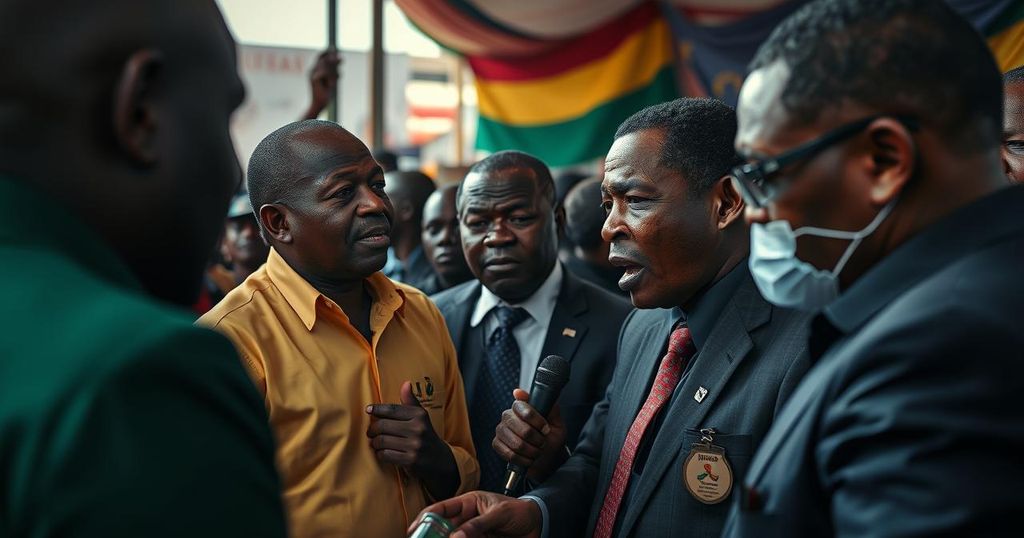Allegations of Electoral Fraud Emerge in Mozambique’s Recent Elections
The elections in Mozambique are facing allegations of serious fraud, with opposition candidates, particularly Venancio Mondlane, claiming significant electoral malpractice by the ruling party FRELIMO. Early results indicate a victory for FRELIMO’s Daniel Chapo, while accusations include disorganization at polling stations, voter list discrepancies, and illegal voting by foreigners. Calls for independent investigations are growing in response to these claims.
The recent elections in Mozambique have ignited allegations of widespread fraud, particularly from opposition candidates. Although the Liberation Front of Mozambique (FRELIMO) appears set to secure victory with its candidate Daniel Chapo, opposition leader Venancio Mondlane claims he has been wronged due to significant electoral malpractice. “What we are seeing here is election rigging of the highest order,” Mondlane stated, indicating that this issue is not unfamiliar in Mozambique’s electoral history. According to initial results, FRELIMO has obtained approximately 53.68% of the votes in the capital, with Mondlane following at 33.84%. Other candidates have lagged considerably, with Ossufo Momade receiving around 9% and Lutero Simango of the Democratic Movement of Mozambique (MDM) obtaining approximately 3% of the votes. An official victory for FRELIMO was also confirmed in the Cabo Delgado region, where Daniel Chapo garnered about 66% of the votes. FRELIMO representatives have defended the electoral process, asserting that the results accurately reflect the citizens’ will, with a FRELIMO secretary proclaiming that “these elections were very transparent.” However, the opposition raises concerns regarding the integrity of the voting process, particularly citing incidents of allegations of vote counting disruptions and unauthorized removal of voters from the electoral rolls. Manuel de Araujo, Renamo’s gubernatorial candidate for Zambezia, has indicated that due to the poor organization of the electoral authorities, many voters were impeded from casting their ballots. He asserted, “There was organized disorganization by the electoral authorities, who did not provide enough staff or the necessary voting materials in many polling stations.” Furthermore, allegations have arisen regarding illegal voting by Zimbabweans, with reports stating thousands of voters purportedly participated without proper Mozambican identification, allegedly encouraged by Zimbabwe’s ruling party, Zanu-PF. These voters reportedly received Mozambican IDs to facilitate their fraudulent participation. An ex-Zanu-PF councilor touted voting for FRELIMO, while investigations are said to have been initiated to confirm these electoral violations resulting from a reported collaboration between FRELIMO and Zanu-PF. As controversy envelops the electoral outcome, demands for a comprehensive investigation into these allegations persist.
Mozambique has a complex political history, characterized by a long-standing rule by FRELIMO since the nation gained independence in 1975. The political scene has been marked by conflict, including a civil war involving the opposition party Renamo, which has historically contested FRELIMO’s rule. Recent elections have, therefore, become a focal point for tensions between the ruling party and various opposition factions, with allegations of electoral fraud being a recurring issue. The context of these current elections is exacerbated by the involvement of foreign individuals, particularly from Zimbabwe, further complicating the integrity of the electoral process.
The elections in Mozambique are unfolding amidst serious allegations of fraud and irregularities, casting doubt upon the legitimacy of the results that favor FRELIMO. The opposition’s claims of organized malpractice, hindrance of voter participation, and the dubious involvement of non-citizens in the voting process underscore the urgent need for scrutiny and accountability. As the political landscape evolves, the potential shift in opposition dynamics could redefine alliances and power structures within Mozambique’s government.
Original Source: www.dw.com




Post Comment